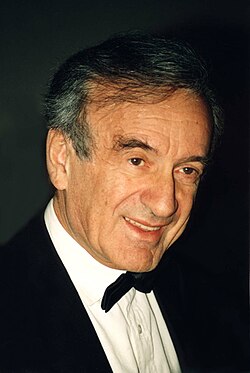Elie Wiesel Quote
If I had spoken to him out loud, he would have understood the tragic fate of those who came back, left over, living dead. You must look at them carefully. Their appearance is deceptive. They are smugglers. They look like the others. They eat, they laugh, they love. The seek money, fame, love. Like the other. But it isn't true; they are playing, sometimes without even knowing it. Anyone who has seen what THEY have seen cannot be like the others, cannot laugh, love, pray, bargain, suffer, have fun, or forget. Like the others. You have to watch them carefully when they pass by an innocent-looking smokestack, or when they lift a piece of bread to their mouths. Something in them shudders and makes you turn your eyes away. These people have been amputated; they haven't lost their legs or eyes, but their will and their taste for life. The things they have seen will come to the surface again sooner or later. And then the world will be frightened and won't dare look these spiritual cripples in the eye.
If I had spoken to him out loud, he would have understood the tragic fate of those who came back, left over, living dead. You must look at them carefully. Their appearance is deceptive. They are smugglers. They look like the others. They eat, they laugh, they love. The seek money, fame, love. Like the other. But it isn't true; they are playing, sometimes without even knowing it. Anyone who has seen what THEY have seen cannot be like the others, cannot laugh, love, pray, bargain, suffer, have fun, or forget. Like the others. You have to watch them carefully when they pass by an innocent-looking smokestack, or when they lift a piece of bread to their mouths. Something in them shudders and makes you turn your eyes away. These people have been amputated; they haven't lost their legs or eyes, but their will and their taste for life. The things they have seen will come to the surface again sooner or later. And then the world will be frightened and won't dare look these spiritual cripples in the eye.
Related Quotes
About Elie Wiesel
As a political activist, Wiesel became a regular speaker on the subject of the Holocaust and remained a strong defender of human rights during his lifetime, advocating for justice in numerous causes around the globe, including that of Soviet Jews and Ethiopian Jews, South African apartheid, the Rwandan genocide, the Bosnian genocide, the War in Darfur, the Kurdish independence movement, the Armenian genocide, Argentina's Desaparecidos, Nicaragua's Miskito people, the Sri Lankan Tamils, and the Cambodian genocide. He was also an outspoken advocate for Israel and frequently weighed in to support the country during escalations of the Arab–Israeli conflict and throughout the Iran–Israel proxy conflict, while also hosting direct talks to facilitate the Israeli–Palestinian peace process.
Wiesel was a professor of the humanities at Boston University, which created the Elie Wiesel Center for Jewish Studies in his honor. He received a number of awards, including the Nobel Peace Prize in 1986. He was a founding board member of the Human Rights Foundation and remained active in it throughout his life. Wiesel was one of the main figures who spearheaded the establishment of the United States Holocaust Memorial Museum in 1993.
